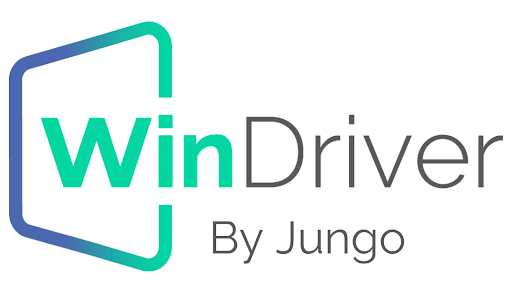Intel’s Multi-Channel DMA (MCDMA) IP extends this capability by supporting concurrent, independent DMA channels in a single core, allowing higher throughput and flexible data management. To integrate and test such IP efficiently in custom boards, developers often face the challenge of writing kernel-mode drivers, handling interrupts, and ensuring portability across operating systems.
Login
Intel – Altera MCDMA IP Sample
Direct Memory Access (DMA) is a cornerstone of modern FPGA and embedded system designs
Home » Direct Memory Access » Intel – Altera MCDMA IP Sample
What is Intel’s MCDMA IP?
Intel provides a suite of DMA IP cores as part of its FPGA offerings. The MCDMA IP is designed as follows:
- Each DMA channel consists of a Host-to-Device (H2D) and a Device-to-Host (D2H) queue pair.
-
Multiple DMA channels within one instance
-
Independent control over each channel
-
Parallel transfers for higher bandwidth utilization
-
Scatter-gather support for non-contiguous memory transfers
-
Provides Avalon®-MM (AVMM) and Avalon®-ST (AVST) interfaces (Note: The sample currently supports only AVMM but it can be adjusted)
-
Descriptor Completion: It offers per-descriptor completion notification using either MSI-X interrupts, Writebacks or polling.
- Control Registers: It provides 4 MB of control register space (mapped to PCIe BAR0) for queue control and status (QCSR), MSI-X interrupt generation, and general global control (GCSR)
In short, MCDMA brings scalability and efficiency, particularly in high-performance FPGA systems with diverse data pipelines.
Why Use WinDriver with MCDMA?
Traditionally, developers working with DMA IP would need to:
- Write kernel-mode drivers for Linux or Windows,
- Implement low-level interrupt service routines,
- Manage scatter-gather descriptors,
- Debug synchronization and memory issues.
This effort can take weeks or months and is prone to errors. Jungo WinDriver provides a cross-platform driver development kit that abstracts these complexities. With WinDriver, engineers can:
- Access FPGA DMA registers directly from user space,
- Rely on automatically generated kernel drivers,
- Use ready-made DMA samples for Intel IP cores (including MCDMA),
- Debug transfers quickly with diagnostic applications,
- Deploy drivers on Windows, Linux, or Linux ARM with minimal changes.
For the MCDMA specifically, Jungo supplies a reference sample that demonstrates:
- Initialization of DMA channels,
- Submitting scatter-gather descriptors,
- Handling channel completion interrupts,
- Monitoring transfer status,
- Gracefully stopping and restarting DMA operations.
Practical Applications
Using MCDMA with WinDriver is particularly beneficial in domains such as:
- Video Processing: Streaming multiple HD video channels simultaneously.
- Networking: Handling packet flows across parallel DMA channels.
- Data Acquisition: Collecting sensor data in real time and writing to memory without CPU bottlenecks.
- AI/ML Acceleration: Feeding large data sets to hardware accelerators with minimal host overhead.
Setting Up the MCDMA IP Sample
- Integrate the MCDMA IP in Intel Quartus Platform Designer
- Configure the IP.
- Connect the DMA and/or bypass interfaces to any peripheral to which you want to grant the host access.
- Generate HDL and program the FPGA
- Compile your design with Quartus.
- Deploy the bitstream to the FPGA board.
- Use Jungo DriverWizard
- Detect the PCIe device hosting the MCDMA.
- Generate a skeleton driver project automatically.
- Run the MCDMA Sample Code
- Jungo’s sample provides C/C++ source that demonstrates channel setup.
- Test memory-to-memory transfers.
- Observe interrupts and completion notifications via the WinDriver API.
- Debug with Diag Application
- WinDriver’s mcdma_diag lets you quickly access registers and confirm that DMA channels are active.
DMA Workflow
Allocate and Lock DMA Buffers
DMA data buffer: Allocate a buffer in user space with malloc(), then lock it for DMA using WDC_DMASGBufLock(). This buffer stores the actual data being transferred.
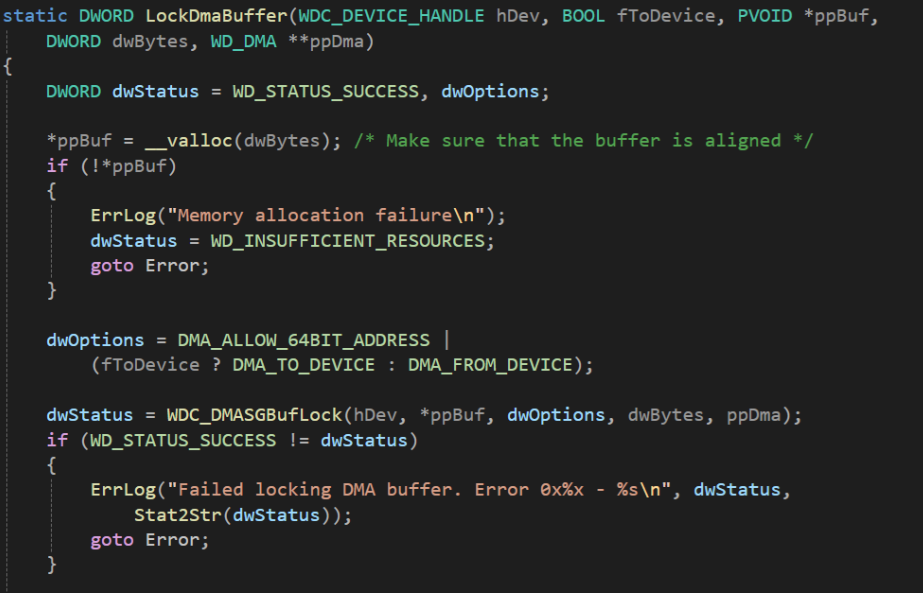
DMA descriptor buffer: Allocate and lock a contiguous buffer using WDC_DMAContigBufLock(). This buffer is configured by the software and holds transfer metadata (e.g., source and destination addresses, block size, completion control, etc.).
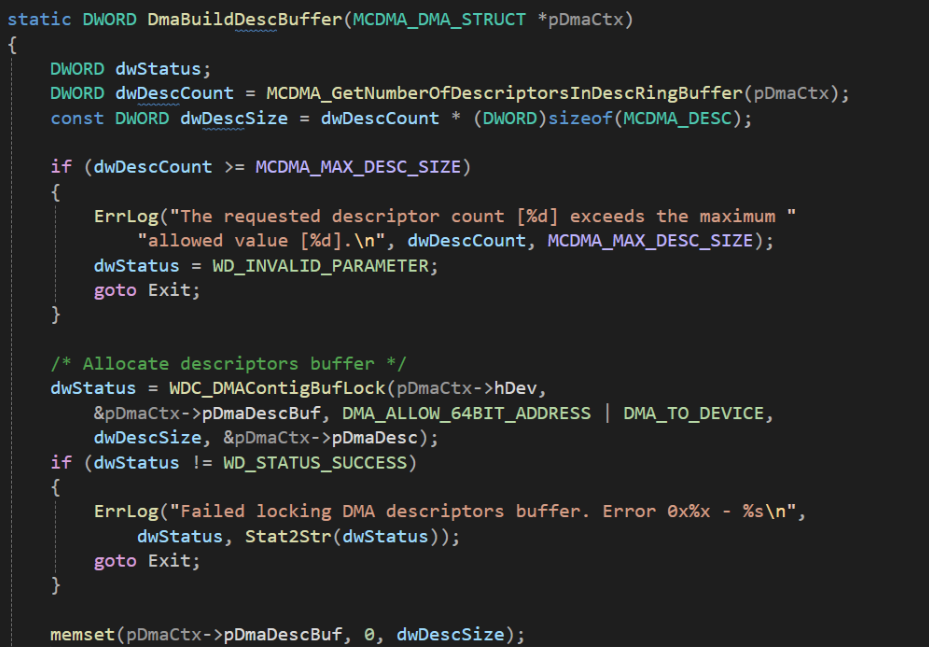
Write-back buffer: (if using write-back completion): Allocate and lock an additional contiguous buffer with WDC_DMAContigBufLock(). This buffer is used by the hardware to store the write-back data.
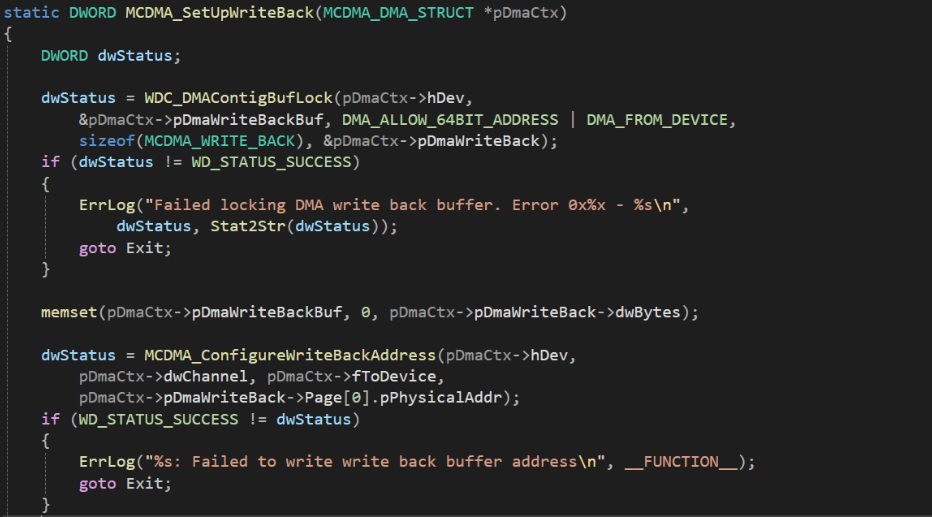
Configure DMA Descriptors
Configure the transfer descriptors: Populate each descriptor with the required metadata (e.g., source and destination addresses, block length, control fields).
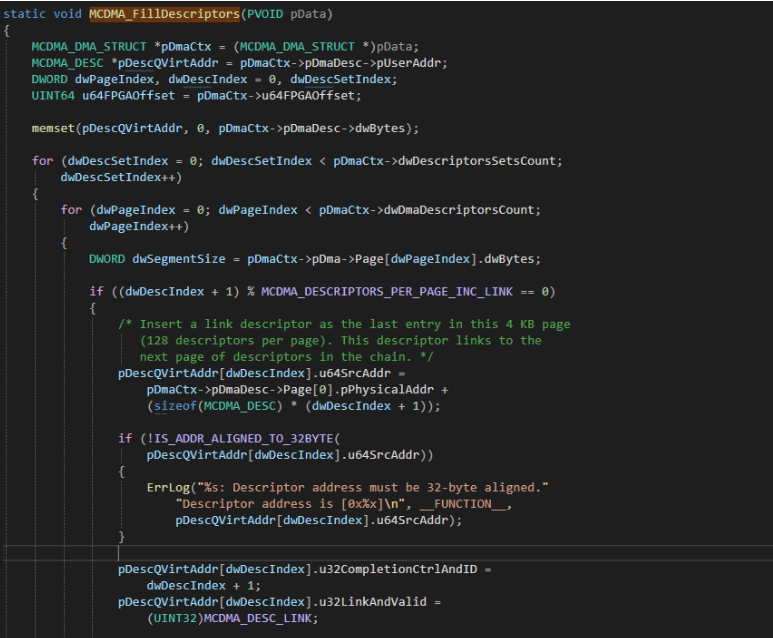
Initialize the queue: Write the base address and total size of the descriptor buffer into the appropriate QCSR registers.
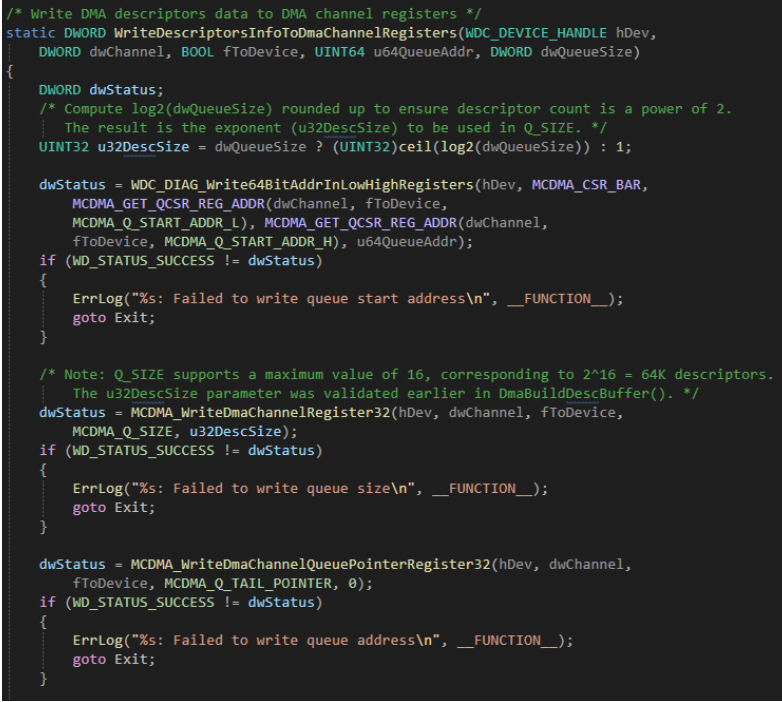
The descriptor is structured as follows:
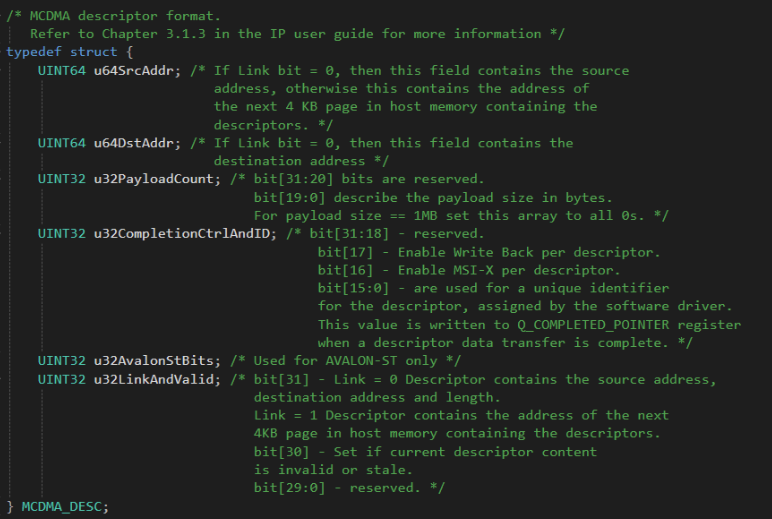
Initiating the DMA Transfer
The transfer is initiated by updating Q_TAIL_POINTER with the index of the last valid descriptor.
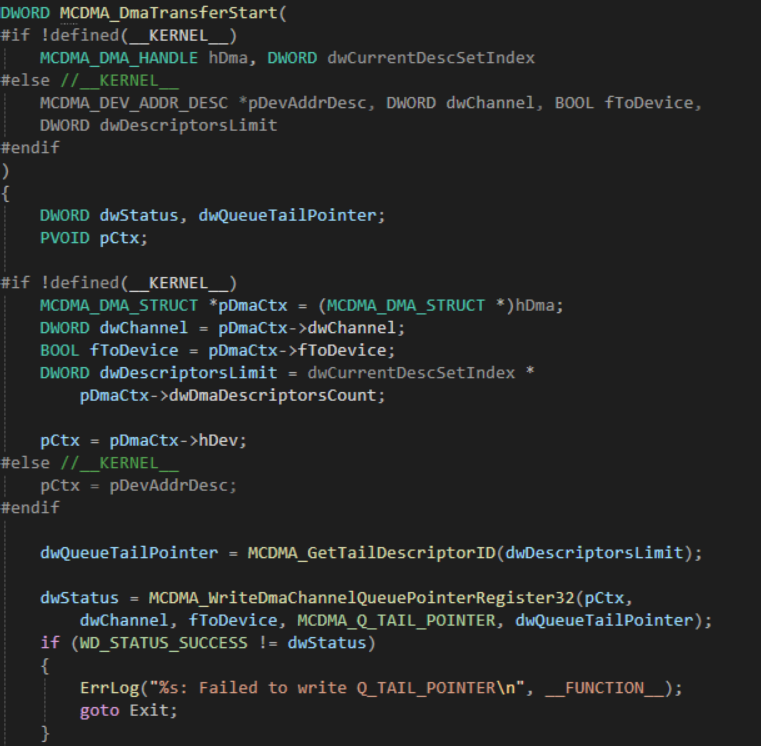
Completion and Interrupt Handling
When the last descriptor completes, one of the following occurs:
- Device register polling: The hardware updates
Q_COMPLETED_POINTERwith the index of the last completed descriptor. - Host memory polling (write-back): The hardware writes the index of the last completed descriptor to host memory at the address specified by
Q_CONSUMED_HEAD_ADDR_L/Q_CONSUMED_HEAD_ADDR_H. - MSI-X interrupts: The hardware raises an interrupt and writes the index of the last completed descriptor to host memory at the address specified by
Q_CONSUMED_HEAD_ADDR_L/Q_CONSUMED_HEAD_ADDR_H.
Cleanup (DMA Close Routine)
Upon transfer completion, the driver must unlock the DMA buffers, release the associated memory, and reset the device registers state.
Key API Interactions
The WinDriver API for DMA abstracts low-level register programming. For example:
WDC_DMASGBufLock()– Used to build the DMA data scatter-gather buffer.WDC_DMAContigBufLock()– Used to build the descriptors list.- Event-handling callbacks tie into channel completion interrupts.
Time Savings
Instead of manually coding interrupt handlers and DMA setup, developers start from a working example.
Cross-Platform
The same driver code runs on Windows, Linux, or ARM-based Linux with minimal adjustments.
Stability
The WinDriver kernel module handles synchronization and memory mapping safely.
Scalability
Developers can extend from a single channel to multiple MCDMA channels by following the sample’s architecture.
Intel® Stratix® 10 GX
Intel® Agilex® 7 FPGAs
Intel® Agilex® 5
- Easy user-mode driver development.
- Friendly DriverWizard allows hardware diagnostics without writing a single line of code.
- Automatically generates the driver code for the project in C, C#.NET, Visual Basic.NET, Python, Java, Delphi (Pascal) (Legacy), or Visual Basic 6.0 (Legacy).
- Supports any USB/PCI/PCI Express device, regardless of manufacturer.
- Enhanced support for specific chipsets frees the developer of the need to study the hardware’s specification.
- Allows accessing your device using a compiled application (in languages such as C/C++, C#.NET, Java, Visual Basic.NET) or from a running script (in scripting languages such as Python, PowerShell and MatLab).
- Applications are binary compatible across Windows 11/10/8.1/Server 2022/Server 2019/Server 2016 (Legacy WinDriver versions for server 2012, Windows 7 and XP, Windows 10 IoT Core for x86/x86_64/ARM CPUs on request).
- Applications are source code compatible across all supported operating systems – Windows 11/10/8.1/Server 2025/Server 2022/Server 2019/Server 2016/Server 2012(Legacy version for Windows 7 and XP), Embedded Windows 11/10/8.1, Windows CE (a.k.a. Windows Embedded Compact) 4.x–7.x (including Windows Mobile), macOS (Yosemite, El Capitan, Sierra, High Sierra, Mojave, Catalina, Big Sur, Monterey) and Linux (Kernel 2.6 and higher).
- Can be used with common development environments, including MS Visual Studio, CMake, XCode, Borland C++ Builder, Borland Delphi, Visual Basic 6.0, MS eMbedded Visual C++, MS Platform Builder C++, GCC, Windows GCC, or any other appropriate compiler/environment.
- No WDK, ETK, DDI or any system-level programming knowledge required.
- Supports multiple CPUs.
- Includes a dynamic driver loader.
- Comprehensive documentation and help files.
- Detailed examples in C, C#, Python, Java, PowerShell, VB.NET.
- HLK / HCK / WHQL certifiable driver (Windows).
- Signable driver (Linux Secure Boot, Apple Certification program).
- No run-time fees or royalties.
- Easy user-mode driver development.
- WinDriver products are accompanied with highly detailed technical references that are designed to assist you in various stages of the development process. If you have just started evaluating or using WinDriver, you may find our Quick Start Guides helpful. Should you require more in-depth information, or would like to know more about the technical aspects of WinDriver, please refer to our Online Manual. For other technical resources, such as FAQs and technical documents see WinDriver’s Support Page.
- Fast: Shorten driver development cycle and time to market.
- Simple: No OS internals or kernel knowledge required.
- Stable: Field-tested on thousands of HW and OS configurations.
- Enhanced Chipset Support: Silicon partners libraries to jump-start your driver development. Special samples for various PCI/USB chip vendors, such as Altera and Xilinx. WinDriver generates a skeletal driver code, customized for the user’s hardware.
- Multiple OS support and cross platform: WinDriver product line supports Windows 11/10/8.1/Server 2025/Server 2022/Server 2019/Server 2016/server 2012(Legacy version for Windows 7 and XP), Embedded Windows 11/10/8.1, Windows CE/Mobile, macOS and Linux. The same driver will run under all supported operating systems without any code modifications. Just recompile! If it’s a script – you don’t even need to recompile!
- Immediate Hardware Access and Debugging: Test your hardware through a graphical user-mode application, without having to write a single line of code. Monitor kernel level activity throughout the driver development process.
- Performance Optimization: Use WinDriver’s Kernel Plug-in technology to develop your driver in the user-mode, then run performance critical sections of it in the Kernel Mode (Ring 0) to achieve optimal performance.
- HLK / HCK/ WHQL Certifiable Driver: WinDriver’s Windows drivers are WHQL ready – you will not need to invest time and efforts on making your driver WHQL compliant. Jungo also can prepare the WHQL submission package for you.
- Field-proven quality: WinDriver’s technology enables you to concentrate on your core business and successfully create first-rate drivers without having to invest redundant resources in driver development from scratch.
- User-mode programming: WinDriver’s architecture enables driver development in the user mode, while maintaining kernel-mode performance.
- 64-bit Support: Allow utilizing the additional bandwidth provided by 64-bit hardware and enable 64-bit data transfer on x86 platforms running 32-bit operating systems. Drivers developed with WinDriver will attain significantly better performance results than drivers written with the DDK or other driver development tools that do not support this feature.
- Complete .NET Framework Support: Easily incorporate WinDriver’s C# or VB.NET code into your existing .NET application or PowerShell script using the powerful object oriented managed extensions for C++ library.
- Complete Java Support: Easily incorporate WinDriver’s API into your existing Java application using the powerful JNI binding of the complete WinDriver API.
- Complete Python Support: Easily incorporate WinDriver’s API into your existing Python script using the powerful Python binding of the complete WinDriver API.
WinDriver for Windows Desktop Supported Platforms
Windows 11 /Windows 10 / Windows 8/ Windows Server 2025 / Windows Server 2022 / Server 2019/ Server 2016 32 bit or 64 bit (x64: AMD64 and Intel EM64T) processor (Legacy Version Windows 7 & XP)
WinDriver for Linux Supported Platforms
- x86 32-bit, x86 64-bit (x86_64: AMD64).
- Supported Linux kernel (including embedded Linux):
- For x86 32-bit architectures: Linux kernel 2.6-5.18.2
- For x86 64-bit architectures: Linux kernel 2.6-5.18.2
- PCI / PCIe
- Any 32-bit or 64-bit development environment (depending on your target platform) supporting C/C++/C#/Visual Basic/Java/Python/PowerShell.
WinDriver for macOS Supported Platforms
- x86 64-bit (x86_64: AMD64).
- Supported macOS:
- MacOS 10.14, 10.15, 11.0 and MacOS 12.0 (ARM64 M1 version) are supported from version 14.8.0. (Legacy versions also support versions 10.10-10.13 as well).
- Any 64-bit development environment (depending on your target platform) supporting C/C++/C#/Visual Basic/Java/Python/PowerShell.
WinDriver for Linux Arm Supported Platforms
- WinDriver generally supports Linux ARM and ARM64 machines, but has been tested on the following systems and kernels:
- ARM Cortex A7 – Broadcom: Raspberry PI 2/3/4 : running Raspbian Stretch with kernel version 4.14.79-v7+. PI 4b: running Raspbian with kernel version 4.19.75-v7l+
- ARM Cortex A9 – Solid Run: I.MX6 MicroSoM i2 (Hummingboard2) running ARMbian’s Ubuntu Xenial Desktop Kernel Version 4.11.6-cubox
- ARM Cortex A9 – Boundary: BL-SL-I.MX6 (formerly Sabre LITE) running Debian nitrogen kernel version 4.9.88-6-boundary-14s
- ARM Cortex A15 – NVidia: Jetson TK1 running Ubuntu 16.04 kernel version 3.10.40-g8c4516e
- ARM64 Cortex A53 – Broadcom: Raspberry PI 3b+ â running 64bit Xubuntu 18.04 kernel version 4.15.0-1010-raspi2 or Ubuntu Server 18.04.2 kernel version 4.15.0-1033-raspi2
- ARM64 Cortex A57 – NVidia: Drive PX2 running Ubuntu 18.04 kernel version 4.9.38-rt25-tegra
- ARM64 Cortex A57 – NVidia: Jetson TX2 running Ubuntu 16.04 kernel version 4.4.38-tegra
- ARM64 v8.2 – NVidia: Jetson NX Xavier / Jetson AGX Xavier running Ubuntu 18.04 kernel version 4.9-tegra
- Any 32-bit or 64-bit development environment (depending on your target platform) supporting C/C++/C#/Visual Basic/Java/Python/PowerShell.
WinDriver(Legacy) for WinCE Supported Platforms
- An x86 / MIPS / ARM Windows CE 4.xâ7.0 (.NET) target platform
- WinCE 2013 – WEC 2013 8.0 for x86 and ARM
- For Windows CE 4.x – 6.0 – Microsoft Embedded Visual C++ with a corresponding target SDK, or Microsoft Platform Builder with a corresponding BSP (Board Support Package) for the target platform; also required for Windows Mobile 6.0 – Microsoft Visual Studio (MSDEV) .NET 2005

WinDriver Download Free 30 Day Trial
WinDriver
"*" indicates required fields
Software License Agreement of WinDriver (TM) Version v16.5.0
© Jungo Connectivity Ltd. 2024 All Rights Reserved
IMPORTANT – READ CAREFULLY: THIS SOFTWARE LICENSE AGREEMENT (“AGREEMENT”) IS A LEGAL AGREEMENT BETWEEN YOU AND JUNGO CONNECTIVITY LTD. (“JUNGO”), FOR THE WINDRIVER SOFTWARE PRODUCT ACCOMPANYING THIS LICENSE (THE “SOFTWARE”). BY INSTALLING, COPYING OR OTHERWISE USING THE SOFTWARE, YOU AGREE TO BE LEGALLY BOUND BY THE TERMS AND CONDITIONS OF THIS AGREEMENT. IF YOU DO NOT AGREE TO THE TERMS AND CONDITIONS OF THIS AGREEMENT, DO NOT INSTALL, COPY, OR OTHERWISE USE THE SOFTWARE.
- OWNERSHIP OF THE SOFTWARE. All right, title, and interest in and to the Software, including associated intellectual property rights, of any sort and/or kind, are and shall remain solely with Jungo and its licensors, and may be protected by copyright, trademark, patent and trade secret law and international treaties. This Agreement does not convey to you an interest in or to the Software, but only a limited, non-transferable, non-sublicensable, non-exclusive, and revocable right of use, in accordance with the terms of this Agreement. You may not remove any proprietary notices and/or any legends from the Software, in whole or in part.
- GRANT OF LICENSE. Jungo hereby grants you a personal, non-exclusive, nontransferable, non-sublicensable node-locked and time limited license to use the Software.
– Individuals: Jungo grants you, as an individual, a personal, non-exclusive, “single-user” license to use the Software on a single computer, in the manner provided below, at the site for which the license was given.
– Entities: If you are an entity, Jungo grants you the right to designate one individual within your organization (and only one) to have the right to use the Software on a single computer, in the manner provided below, at the site for which the license was given.
– License Scope: A single user license allows usage of WinDriver and redistribution of certain components (as defined below) within a single end product SKU, for a single device (identified by its VID/PID (USB) or VID/DID (PCI)), and without SDK/API capabilities. If you need extended license or distribution rights, please contact Jungo.
- EVALUATION LICENSE. If you have not yet paid license fees for the use of the Software, then Jungo hereby grants you a personal, non-exclusive, non-transferable and non-sublicensable license to internally use the Software for evaluation purposes only, for a period of 30 days (the “Evaluation License”). If, after the expiration of the Evaluation License, you wish to continue using the Software and accompanying written materials, you may do so by remitting the required payment to Jungo, and you will then receive a registration code and a license string that will permit you to use the Software on a single computer under one of the license schemes specified in Section 2 above.
- SERVICE OPTIMIZATION AND ENHANCEMENT. To continuously improve and optimize Jungo’s services, Jungo reserves the right to anonymously monitor, collect, and analyze usage data, including but not limited to API interactions, performance metrics, and system activity. Such data collection and analysis shall be conducted in compliance with all applicable laws and regulations and shall be used solely for the purpose of enhancing service performance, security, and reliability.
- SUBSCRIPTION, SERVICE CONTINUITY, RENEWAL, AND LATE PAYMENT PENALTIES. Access to the WinDriver and its associated features is provided on a subscription basis, subject to annual renewal. Failure to renew the subscription before the expiration date may result in the automatic termination of access to the platform and all related services, and additional fees (including but not limited to late payment penalties, administrative charges, or reinstatement costs). Upon termination, the user shall forfeit any rights to continued use, and we reserve the right to suspend or delete any associated accounts, data, or functionalities without further notice.
- OPEN SOURCE. The Software includes certain files that are subject to open source licenses. These files are identified in their header files (“Open Source Files”). You must use the Open Source Files in accordance with the terms of their respective licenses. In the event of any contradiction between the terms of this Agreement, and the terms of the open source license accompanying a certain Open Source File, the terms of the latter shall prevail, with regard to the said Open Source File.
RESTRICTIONS ON USE AND TRANSFER
- DISTRIBUTION OF FILES.
(a) You may not distribute, or otherwise transfer or assign, any portion of the Software, including any of the headers or source files that are included in the Software, unless otherwise expressly permitted in this Agreement, subject to the provisions of Section 4 above.
(b) Subject to your full and continued compliance with the terms of this Agreement, including the ongoing payment of annual license fees, you may distribute the following files:
Windows:
– windrvr1650.sys
– windrvr1650_legacy.sys
– windrvr1650.inf
– windrvr1650.cat
– wdapi1650.dll
– wdapi1650_32.dll
– wdapi1650_arm64.dll
– wdapi_dotnet1650.dll
– wdapi_dotnet1650_32.dll
– wdapi_netcore1650.dll
– wdapi_java1650.dll
– wdapi_java1650.jar
– wdreg.exe
– difxapi.dll
– devcon.exe
Linux:
– windrvr_gcc_v3.o_shipped
– windrvr_gcc_v3_regparm.o_shipped
– kp_linux_gcc_v3.o
– kp_linux_gcc_v3_regparm.o
– libwdapi1650.so libwdapi1650_32.so
– libwdapi_java1650.so
– libwdapi_java1650_32.so
– wdapi_java1650.jar
– wdapi_netcore1650.dll
– kp_wdapi1650_gcc_v3.o_shipped
– kp_wdapi1650_gcc_v3_regparm.o_shipped
– linux_wrappers.c
– linux_wrappers.h
– wdusb_linux.c
– wdusb_interface.h
– wd_ver.h
– linux_common.h
– windrvr.h
– windrvr_usb.h
– wdsriov_interface.h
– wdsriov_linux.c
– wdreg
– configure makefile.in
– configure.wd makefile.wd.in
– makefile.wd.kbuild.in
– configure.usb
– makefile.usb.in
– makefile.usb.kbuild.in
– setup_inst_dir
macOS:
– libwdapi1650.dyld
– libwdapi_java1650.jar
– libwdapi_java1650.dyld
– wdapi_netcore1650.dll
– WinDriver1650.kext
– WinDriver1650.dext
– wd_mac_install.sh
– wd_mac_uninstall.sh
(c) The files listed in Section 5.b above may be distributed only as part of a complete application that you distribute under your organization name, and only if they significantly contribute to the functionality of your application. For avoidance of doubt, each organization distributing these files as part of the organization products is required to have valid license(s) under the organization name/VID, irrespective of the party who actually performed the product development. Licenses granted to subcontractors do not grant distribution or other rights to the organizations for which they are developing.
(d) The distribution of the windrvr.h header file is permitted only on Linux.
(e) You may not modify the distributed files specified in Section 5.b of this Agreement.
(f) You may not distribute any header file that describes the WinDriver functions, or functions that call the WinDriver functions and have the same basic functionality as that of the WinDriver functions.
- The Software may not be used to develop a development product, an API, or any products, which will eventually be part of a development product or environment, without the written consent of Jungo and subject to additional fees and licensing terms.
- You may make printed copies of the written materials accompanying the Software, provided that only users bound by this license use them.
- You may not allow any third party to use the Software, grant access to the Software (or any portion thereof) to any third party, or otherwise make any commercial use of the Software, including without limitation, assign, distribute, sublicense, transfer, pledge, lease, rent, or share your rights in the Software or any of your rights under this Agreement, all whether or not for any consideration.
- You may not translate, reverse engineer, decompile, disassemble, reproduce, duplicate, copy, or otherwise disseminate all or any part of the Software, or extract source code from the object code of the Software.
- Jungo reserves the right to revise, update, change, modify, add to, supplement, or delete any and all terms of this License Agreement; provided, however, that changes to this License Agreement will not be applied retroactively. Such changes will be effective with or without prior notice to you. You can review the most current version of this License Agreement under the WinDriver download form page.
- You may not incorporate or link any open source software with any open source software part of the Software, or otherwise take any action which may cause the Software or any portion thereof to be subjected to the terms of the Free Software Foundation’s General Public License (GPL) or Lesser General Public License (LGPL), or of any other open source code license.
- DISCLAIMER OF WARRANTY. THIS SOFTWARE AND ITS ACCOMPANYING WRITTEN MATERIALS ARE PROVIDED BY JUNGO “AS IS” WITHOUT ANY WARRANTY. ANY EXPRESS OR IMPLIED WARRANTIES, INCLUDING, BUT NOT LIMITED TO, THE IMPLIED WARRANTIES OF MERCHANTABILITY, FITNESS FOR A PARTICULAR PURPOSE, AND NON-INFRINGEMENT, ARE HEREBY DISCLAIMED TO THE FULLEST EXTENT PERMITTED UNDER APPLICABLE LAW.
- NO LIABILITY. TO THE FULLEST EXTENT PERMITTED BY APPLICABLE LAW, IN NO EVENT SHALL JUNGO OR ITS LICENSORS BE LIABLE FOR ANY DIRECT, INDIRECT, INCIDENTAL, SPECIAL, EXEMPLARY, OR CONSEQUENTIAL DAMAGES (INCLUDING, BUT NOT LIMITED TO, PROCUREMENT OF SUBSTITUTE GOODS OR SERVICES; LOSS OF USE, DATA, SAVINGS, IP INFRINGEMENT OR PROFITS; OR BUSINESS INTERRUPTION) HOWEVER CAUSED AND ON ANY THEORY OF LIABILITY, WHETHER IN CONTRACT, STRICT LIABILITY, OR TORT (INCLUDING NEGLIGENCE OR OTHERWISE) ARISING IN ANY WAY OUT OF THE USE OF THIS SOFTWARE, EVEN IF ADVISED OF THE POSSIBILITY OF SUCH DAMAGE.
- Governing Law. This Agreement and use of the Software are governed by the laws of the State of Israel, regardless of its conflict of laws rules, and the competent courts of the State of Israel shall have sole and exclusive jurisdiction over any dispute under this Agreement or otherwise related to the Software.
- Confidentiality. The Software, including any additional information related thereto, contains confidential and proprietary information of Jungo. Accordingly, you agree that you will not, nor allow any third party to, disseminate, transfer, grant access to, or otherwise disclose to any third party the Software or any part thereof or any other confidential or proprietary information of Jungo provided in connection therewith. You will maintain all copies of the Software and all related documentation in confidence.
- Termination and Effects of Termination. Jungo may terminate this Agreement and the licenses granted to you hereunder at any time if you breach any of your obligations hereunder, by issuance of written notice to such effect, addressed to you at the address you provided in your registration form. Upon expiration or other termination of this Agreement, the Licenses granted to you hereunder shall immediately and automatically be canceled, and you will immediately remove all copies of the Software from your computer(s) and cease any use thereof.
- Contact Details. If you have any questions concerning this Agreement or wish to contact Jungo for any reason —
Web site: https://www.jungo.com
Email: [email protected]
- US GOVERNMENT RESTRICTED RIGHTS. The Software and documentation are provided with RESTRICTED RIGHTS.
Use, duplication, or disclosure by the Government is subject to restrictions set forth in subparagraph (c)(1) of The Rights in Technical Data and Computer Software clause at DFARS 252.227-7013 or subparagraphs (c)(1)(ii) and (2) of Commercial Computer Software – Restricted Rights at 48 CFR 52.227-19, as applicable.
- Automatic Renewal. The subscription shall be automatically renewed, unless Licensee notifies Licensor 30 days or more prior to the expiration date of the subscription, of its intent not to renew the subscription.

WinDriver Download Free 30 Day Trial
WinDriver
"*" indicates required fields
Software License Agreement of WinDriver (TM) Version v16.5.0
© Jungo Connectivity Ltd. 2024 All Rights Reserved
IMPORTANT – READ CAREFULLY: THIS SOFTWARE LICENSE AGREEMENT (“AGREEMENT”) IS A LEGAL AGREEMENT BETWEEN YOU AND JUNGO CONNECTIVITY LTD. (“JUNGO”), FOR THE WINDRIVER SOFTWARE PRODUCT ACCOMPANYING THIS LICENSE (THE “SOFTWARE”). BY INSTALLING, COPYING OR OTHERWISE USING THE SOFTWARE, YOU AGREE TO BE LEGALLY BOUND BY THE TERMS AND CONDITIONS OF THIS AGREEMENT. IF YOU DO NOT AGREE TO THE TERMS AND CONDITIONS OF THIS AGREEMENT, DO NOT INSTALL, COPY, OR OTHERWISE USE THE SOFTWARE.
- OWNERSHIP OF THE SOFTWARE. All right, title, and interest in and to the Software, including associated intellectual property rights, of any sort and/or kind, are and shall remain solely with Jungo and its licensors, and may be protected by copyright, trademark, patent and trade secret law and international treaties. This Agreement does not convey to you an interest in or to the Software, but only a limited, non-transferable, non-sublicensable, non-exclusive, and revocable right of use, in accordance with the terms of this Agreement. You may not remove any proprietary notices and/or any legends from the Software, in whole or in part.
- GRANT OF LICENSE. Jungo hereby grants you a personal, non-exclusive, nontransferable, non-sublicensable node-locked and time limited license to use the Software.
– Individuals: Jungo grants you, as an individual, a personal, non-exclusive, “single-user” license to use the Software on a single computer, in the manner provided below, at the site for which the license was given.
– Entities: If you are an entity, Jungo grants you the right to designate one individual within your organization (and only one) to have the right to use the Software on a single computer, in the manner provided below, at the site for which the license was given.
– License Scope: A single user license allows usage of WinDriver and redistribution of certain components (as defined below) within a single end product SKU, for a single device (identified by its VID/PID (USB) or VID/DID (PCI)), and without SDK/API capabilities. If you need extended license or distribution rights, please contact Jungo.
- EVALUATION LICENSE. If you have not yet paid license fees for the use of the Software, then Jungo hereby grants you a personal, non-exclusive, non-transferable and non-sublicensable license to internally use the Software for evaluation purposes only, for a period of 30 days (the “Evaluation License”). If, after the expiration of the Evaluation License, you wish to continue using the Software and accompanying written materials, you may do so by remitting the required payment to Jungo, and you will then receive a registration code and a license string that will permit you to use the Software on a single computer under one of the license schemes specified in Section 2 above.
- SERVICE OPTIMIZATION AND ENHANCEMENT. To continuously improve and optimize Jungo’s services, Jungo reserves the right to anonymously monitor, collect, and analyze usage data, including but not limited to API interactions, performance metrics, and system activity. Such data collection and analysis shall be conducted in compliance with all applicable laws and regulations and shall be used solely for the purpose of enhancing service performance, security, and reliability.
- SUBSCRIPTION, SERVICE CONTINUITY, RENEWAL, AND LATE PAYMENT PENALTIES. Access to the WinDriver and its associated features is provided on a subscription basis, subject to annual renewal. Failure to renew the subscription before the expiration date may result in the automatic termination of access to the platform and all related services, and additional fees (including but not limited to late payment penalties, administrative charges, or reinstatement costs). Upon termination, the user shall forfeit any rights to continued use, and we reserve the right to suspend or delete any associated accounts, data, or functionalities without further notice.
- OPEN SOURCE. The Software includes certain files that are subject to open source licenses. These files are identified in their header files (“Open Source Files”). You must use the Open Source Files in accordance with the terms of their respective licenses. In the event of any contradiction between the terms of this Agreement, and the terms of the open source license accompanying a certain Open Source File, the terms of the latter shall prevail, with regard to the said Open Source File.
RESTRICTIONS ON USE AND TRANSFER
- DISTRIBUTION OF FILES.
(a) You may not distribute, or otherwise transfer or assign, any portion of the Software, including any of the headers or source files that are included in the Software, unless otherwise expressly permitted in this Agreement, subject to the provisions of Section 4 above.
(b) Subject to your full and continued compliance with the terms of this Agreement, including the ongoing payment of annual license fees, you may distribute the following files:
Windows:
– windrvr1650.sys
– windrvr1650_legacy.sys
– windrvr1650.inf
– windrvr1650.cat
– wdapi1650.dll
– wdapi1650_32.dll
– wdapi1650_arm64.dll
– wdapi_dotnet1650.dll
– wdapi_dotnet1650_32.dll
– wdapi_netcore1650.dll
– wdapi_java1650.dll
– wdapi_java1650.jar
– wdreg.exe
– difxapi.dll
– devcon.exe
Linux:
– windrvr_gcc_v3.o_shipped
– windrvr_gcc_v3_regparm.o_shipped
– kp_linux_gcc_v3.o
– kp_linux_gcc_v3_regparm.o
– libwdapi1650.so libwdapi1650_32.so
– libwdapi_java1650.so
– libwdapi_java1650_32.so
– wdapi_java1650.jar
– wdapi_netcore1650.dll
– kp_wdapi1650_gcc_v3.o_shipped
– kp_wdapi1650_gcc_v3_regparm.o_shipped
– linux_wrappers.c
– linux_wrappers.h
– wdusb_linux.c
– wdusb_interface.h
– wd_ver.h
– linux_common.h
– windrvr.h
– windrvr_usb.h
– wdsriov_interface.h
– wdsriov_linux.c
– wdreg
– configure makefile.in
– configure.wd makefile.wd.in
– makefile.wd.kbuild.in
– configure.usb
– makefile.usb.in
– makefile.usb.kbuild.in
– setup_inst_dir
macOS:
– libwdapi1650.dyld
– libwdapi_java1650.jar
– libwdapi_java1650.dyld
– wdapi_netcore1650.dll
– WinDriver1650.kext
– WinDriver1650.dext
– wd_mac_install.sh
– wd_mac_uninstall.sh
(c) The files listed in Section 5.b above may be distributed only as part of a complete application that you distribute under your organization name, and only if they significantly contribute to the functionality of your application. For avoidance of doubt, each organization distributing these files as part of the organization products is required to have valid license(s) under the organization name/VID, irrespective of the party who actually performed the product development. Licenses granted to subcontractors do not grant distribution or other rights to the organizations for which they are developing.
(d) The distribution of the windrvr.h header file is permitted only on Linux.
(e) You may not modify the distributed files specified in Section 5.b of this Agreement.
(f) You may not distribute any header file that describes the WinDriver functions, or functions that call the WinDriver functions and have the same basic functionality as that of the WinDriver functions.
- The Software may not be used to develop a development product, an API, or any products, which will eventually be part of a development product or environment, without the written consent of Jungo and subject to additional fees and licensing terms.
- You may make printed copies of the written materials accompanying the Software, provided that only users bound by this license use them.
- You may not allow any third party to use the Software, grant access to the Software (or any portion thereof) to any third party, or otherwise make any commercial use of the Software, including without limitation, assign, distribute, sublicense, transfer, pledge, lease, rent, or share your rights in the Software or any of your rights under this Agreement, all whether or not for any consideration.
- You may not translate, reverse engineer, decompile, disassemble, reproduce, duplicate, copy, or otherwise disseminate all or any part of the Software, or extract source code from the object code of the Software.
- Jungo reserves the right to revise, update, change, modify, add to, supplement, or delete any and all terms of this License Agreement; provided, however, that changes to this License Agreement will not be applied retroactively. Such changes will be effective with or without prior notice to you. You can review the most current version of this License Agreement under the WinDriver download form page.
- You may not incorporate or link any open source software with any open source software part of the Software, or otherwise take any action which may cause the Software or any portion thereof to be subjected to the terms of the Free Software Foundation’s General Public License (GPL) or Lesser General Public License (LGPL), or of any other open source code license.
- DISCLAIMER OF WARRANTY. THIS SOFTWARE AND ITS ACCOMPANYING WRITTEN MATERIALS ARE PROVIDED BY JUNGO “AS IS” WITHOUT ANY WARRANTY. ANY EXPRESS OR IMPLIED WARRANTIES, INCLUDING, BUT NOT LIMITED TO, THE IMPLIED WARRANTIES OF MERCHANTABILITY, FITNESS FOR A PARTICULAR PURPOSE, AND NON-INFRINGEMENT, ARE HEREBY DISCLAIMED TO THE FULLEST EXTENT PERMITTED UNDER APPLICABLE LAW.
- NO LIABILITY. TO THE FULLEST EXTENT PERMITTED BY APPLICABLE LAW, IN NO EVENT SHALL JUNGO OR ITS LICENSORS BE LIABLE FOR ANY DIRECT, INDIRECT, INCIDENTAL, SPECIAL, EXEMPLARY, OR CONSEQUENTIAL DAMAGES (INCLUDING, BUT NOT LIMITED TO, PROCUREMENT OF SUBSTITUTE GOODS OR SERVICES; LOSS OF USE, DATA, SAVINGS, IP INFRINGEMENT OR PROFITS; OR BUSINESS INTERRUPTION) HOWEVER CAUSED AND ON ANY THEORY OF LIABILITY, WHETHER IN CONTRACT, STRICT LIABILITY, OR TORT (INCLUDING NEGLIGENCE OR OTHERWISE) ARISING IN ANY WAY OUT OF THE USE OF THIS SOFTWARE, EVEN IF ADVISED OF THE POSSIBILITY OF SUCH DAMAGE.
- Governing Law. This Agreement and use of the Software are governed by the laws of the State of Israel, regardless of its conflict of laws rules, and the competent courts of the State of Israel shall have sole and exclusive jurisdiction over any dispute under this Agreement or otherwise related to the Software.
- Confidentiality. The Software, including any additional information related thereto, contains confidential and proprietary information of Jungo. Accordingly, you agree that you will not, nor allow any third party to, disseminate, transfer, grant access to, or otherwise disclose to any third party the Software or any part thereof or any other confidential or proprietary information of Jungo provided in connection therewith. You will maintain all copies of the Software and all related documentation in confidence.
- Termination and Effects of Termination. Jungo may terminate this Agreement and the licenses granted to you hereunder at any time if you breach any of your obligations hereunder, by issuance of written notice to such effect, addressed to you at the address you provided in your registration form. Upon expiration or other termination of this Agreement, the Licenses granted to you hereunder shall immediately and automatically be canceled, and you will immediately remove all copies of the Software from your computer(s) and cease any use thereof.
- Contact Details. If you have any questions concerning this Agreement or wish to contact Jungo for any reason —
Web site: https://www.jungo.com
Email: [email protected]
- US GOVERNMENT RESTRICTED RIGHTS. The Software and documentation are provided with RESTRICTED RIGHTS.
Use, duplication, or disclosure by the Government is subject to restrictions set forth in subparagraph (c)(1) of The Rights in Technical Data and Computer Software clause at DFARS 252.227-7013 or subparagraphs (c)(1)(ii) and (2) of Commercial Computer Software – Restricted Rights at 48 CFR 52.227-19, as applicable.
- Automatic Renewal. The subscription shall be automatically renewed, unless Licensee notifies Licensor 30 days or more prior to the expiration date of the subscription, of its intent not to renew the subscription.
|
Webinar: FPGA & Driver Development on PCIe, SoC, and Cloud AWS |
